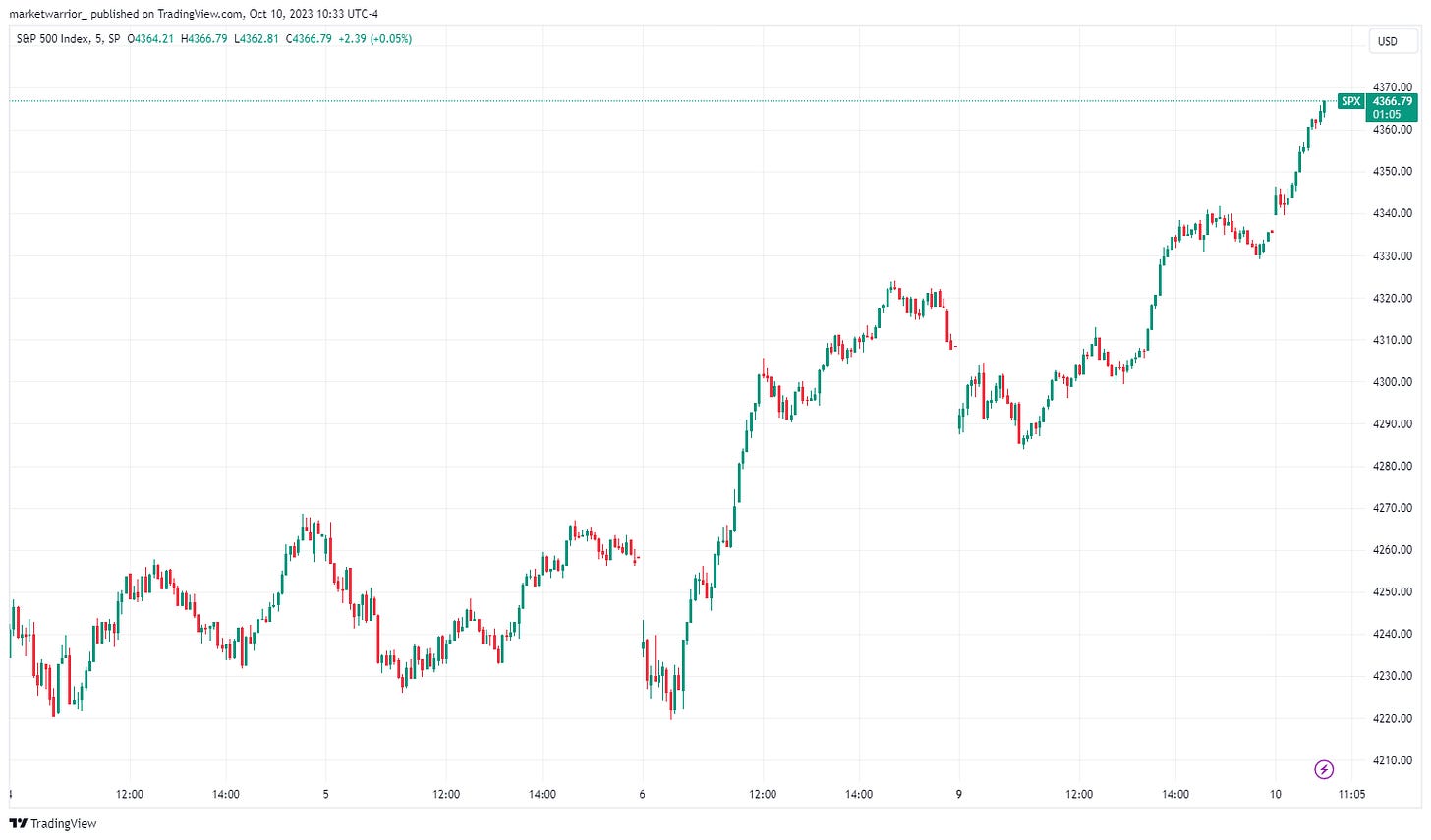Dovish Fed Speak and Geopolitical Tensions Trigger Retreat in Treasury Yields
Benefiting stocks and other risk assets
Geopolitics continues to dominate the headlines as Israel's Prime Minister Netanyahu said on Monday that the offensive in the Gaza Strip has "only just started." President Joe Biden is due to speak today (13:00 EDT), with more aid to potentially come. White House spokesperson John Kirby said that the timing of any new Israel aid package is up in the air. From the market’s perspective, Fed speak since yesterday has been driving the price action.
US Treasury Market Update
US yields have reset lower after reopening. US 2y yields are back below 5%, with 10y yields at 4.66%. The 10Yr US Treasuries are having their best day in around 7 months as demand for safe-haven assets along with recent Fed comments are helping the bonds recover from deeply oversold levels.
Fed Speak
On Monday, Fed's Logan, a renowned hawk. Logan stated that the higher yields may mean there is less need to raise Fed rates further, with financial conditions also tightening ‘substantially in recent months’. Logan noted that if these long-term rate increases were a result of higher term premiums, this would further add to the argument against another Fed hike. Following Logan’s comments, the rate priced in by Fed futures for December 2024 fell back -18.0bps to 4.46%
The Fed’s Barr further added to the dovish Fed speak, stating that “significant progress” has been made “on bringing inflation toward the direction we want”, and is “not overly focused on one number coming in”. Barr also commented on the labour market, which “remains tight”, but supply and demand factors are coming “into better balance”. Fed’s Vice Chair Jefferson also struck a cautious tone, saying he would “remain cognizant of the tightening in financial conditions through higher bond yields”
Fed’s Bostic headlines are rolling as this note goes to press, and he is clearly dovish
*BOSTIC: DON'T HAVE A RECESSION FORECAST IN MY RATE PROJECTION
*BOSTIC: I DON'T THINK WE NEED TO INCREASE RATES ANYMORE
*BOSTIC: ECONOMY IS CLEARLY SLOWING, LOT OF IMPACT YET TO COME
*BOSTIC: US ECONOMY IS SOLID AND STRONG
*BOSTIC: IF OUTLOOK CHANGES, MIGHT NEED TO RAISE FURTHER
Equities
The complex backdrop led to swings in US equities. The S&P 500 rebounded and paired losses from overnight to close +0.63%. Looking at sector performance since Friday, gains have been broad based. Oversold conditions and lower rates (treasury yields) on the back of the dovish Fed speak has led to equities continuing to gain this morning.
China
The developments in Israel were not the only geopolitical news on Monday. US Senate Majority Leader Schumer met with Chinese President Xi in Beijing to discuss US-China relations in Xi’s first meeting with US senators since 2015. The discussion emphasized that the two superpowers should focus on improving relations, with Xi commenting the countries “should respect each other and collaborate”, with a “thousand reasons to improve relations, no reason to make them worse”.
Bloomberg also reported that China is considering raising its budget deficit for 2023 as the government prepares to unleash a new round of stimulus to help the economy meet the official growth target, according to people familiar with the matter.
Policymakers are weighing the issuance of at least 1 trillion yuan ($137 billion) of additional sovereign debt for spending on infrastructure such as water conservancy projects, said the people, asking not be identified discussing a private matter. That could raise this year’s budget deficit to well above the 3% cap set in March, one of the people said. An announcement may come as early as this month, another person said, though deliberations are ongoing and the government’s plans could change.
The discussions underscore mounting concerns among China’s top leadership over the trajectory of the world’s second-largest economy and how growth compares to the US. It would also mark a shift in Beijing’s stance as the government has so far avoided broader fiscal stimulus despite a deepening property crisis and rising deflationary pressure that have put the growth goal of around 5% for the year at risk.
Oil
Oil was the biggest beneficiary in the aftermath of Hamas’ surprise attack on Israel early Saturday. Brent crude prices are trading around $87.5/bbl compared to $84.5 on Friday. Crude jumped on fears that the Hamas attack on Israel may roil the wider Middle East. Israel pointed the finger at Iran, which denied it was involved. A wider conflict including Iran may impact the oil trade through the Strait of Hormuz, a channel Iran has previously threatened to shut.
The conflict has already affected commodity production, after it was reported that Chevron had been told to shut down output at its Tamar Gas Platform, a major gas field, by Israeli officials.





